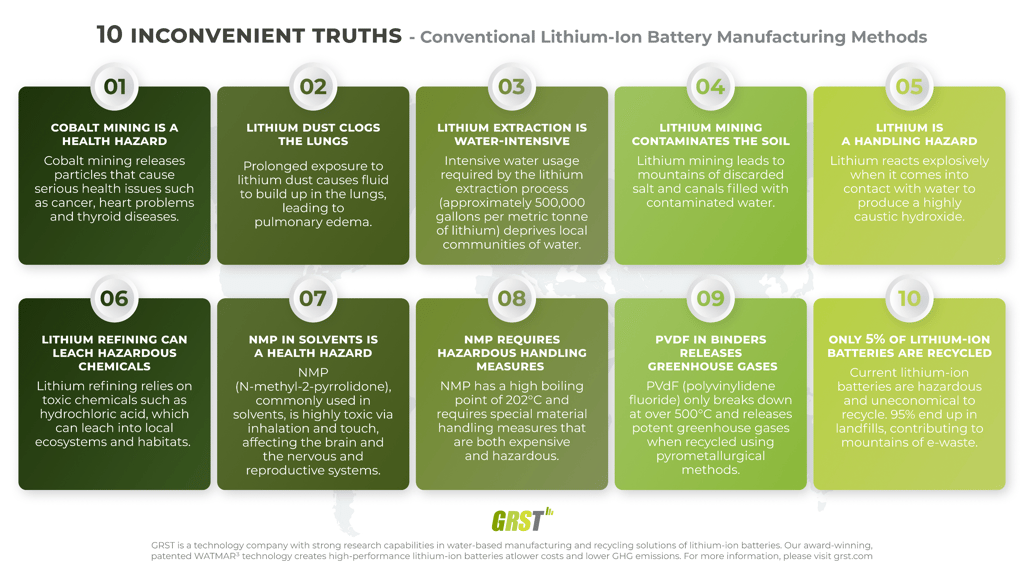
Press release
For media inquiries, please email andrew.sum@grst.com
GRST Issues a List of 10 Inconvenient Truths about Conventional Lithium-ion Battery Manufacturing Methods
Hong Kong, 2nd August 2021 – GRST has issued a list of ten inconvenient truths about the impact that the production and recycling of lithium-ion batteries have on our climate, water sources, wildlife, and communities.
The award-winning water-based battery technology start-up estimates that any conventional lithium-ion battery pack found in an electric vehicle, mobile device, or energy storage solution releases about 95 to 122 kilograms of greenhouse gases per kilowatt-hour of energy during one life cycle, from mining and manufacture until the first time it is recycled ¹. This means that the batteries found in an average 80-kilowatt-hour electric vehicle can release as much as 9.76 tonnes of greenhouse gases during one battery life cycle. Up to 78% of these gases are emitted during the manufacturing process.
“The devastating environmental impact of lithium-ion batteries led the founders of GRST to explore the possibility of manufacturing cleaner, safer, and cheaper lithium-ion batteries in a toxic-free environment as early as 2011. That mission is even more critical today, given that the demand for lithium-ion batteries is expected to grow at a CAGR of 12.3% from USD 41.1 billion in 2021 to USD 116.6 billion by 2030²,” said Mr. Justin Hung, co-founder and CEO of GRST.
The inventors of WATMAR³ believe that the global lithium-ion battery manufacturing industry is ripe for change, not only because of its polluting nature but also necessity. GRST predicts that lithium and cobalt, both essential components for lithium-ion batteries, will run into supply shortages as early as 2025. The ability to recycle already mined raw materials has become mission critical. Currently, over 95% of end-of-life lithium-ion batteries are sent to landfills.
“Equally important to us was the ability to recycle the depleted batteries in a greener way. At that time, Bill had been researching battery technologies for over 10 years as part of his PhD in electrochemistry, while I was running a business promoting eco-friendly water-based chemicals, such as sol-gel coating. The clean, water-based WATMAR³ lithium-ion battery technology is the result of our collaboration,” continued Mr. Hung. “The technology even won the Grand Prix at the 49th International Exhibition of Inventions Geneva.”
“WATMAR³ technology uses water as the processing solvent, while conventional lithium-ion battery manufacturing methods use toxic solvents and chemicals, such as N-methyl-2-pyrrolidone (NMP) and polyvinylidene fluoride (PVdF). In addition to being abundant and natural, water has lots of advantages: it has no adverse effect on the environment, is easy to recover and reuse in an industrial process, and has a lower boiling point compared to many organic solvents. As a result, production of water-based WATMAR³ lithium-ion batteries cuts greenhouse gas emissions by up to 40% compared to current methods. At the same time, the recycling of WATMAR³ batteries leads to up to 99% recovery of vital raw materials, such as lithium and cobalt, while cutting greenhouse gas emissions by up to 80%,” explained Dr. Bill Ho, co-founder and Chief Scientific Officer of GRST.
GRST says that the ease of recovering and recycling precious materials from lithium-ion batteries using its WATMAR³ water solvent and water-soluble binder makes a closed economy now both cleaner and more economically feasible for every battery manufacturer, user, seller, and recycler.
About GRST
GRST is a technology company with strong research capabilities in water-based manufacturing and recycling solutions of lithium-ion batteries. Our award-winning, patented WATMAR³ technology creates high-performance lithium-ion batteries at lower costs and lower GHG emissions. For more information, please visit grst.com




